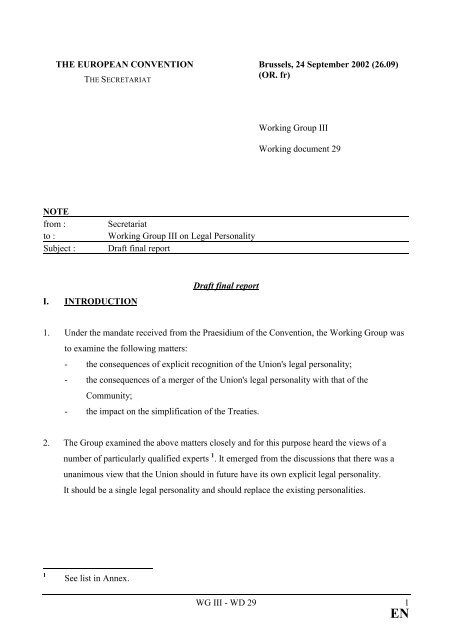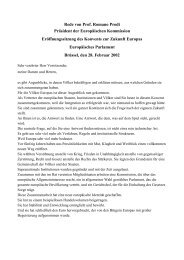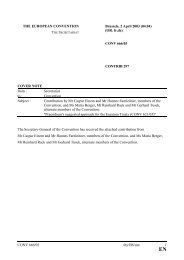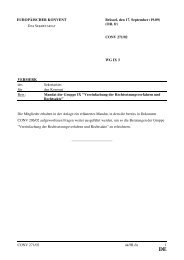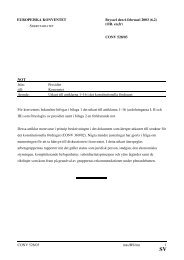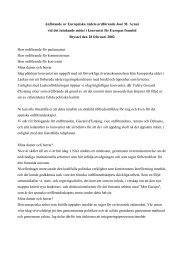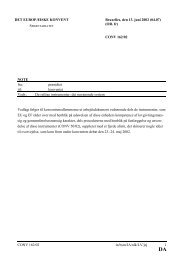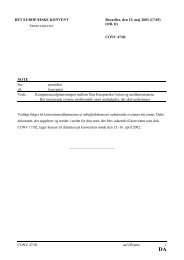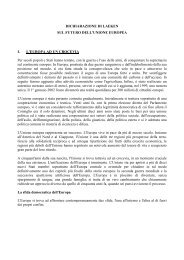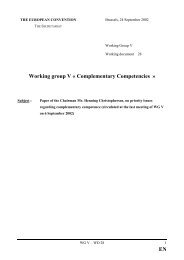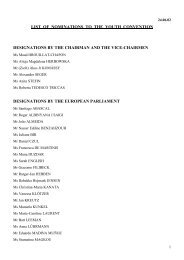WG III - WD 29 1 THE EUROPEAN CONVENTION Brussels, 24 ...
WG III - WD 29 1 THE EUROPEAN CONVENTION Brussels, 24 ...
WG III - WD 29 1 THE EUROPEAN CONVENTION Brussels, 24 ...
You also want an ePaper? Increase the reach of your titles
YUMPU automatically turns print PDFs into web optimized ePapers that Google loves.
<strong>THE</strong> <strong>EUROPEAN</strong> <strong>CONVENTION</strong><br />
<strong>THE</strong> SECRETARIAT<br />
NOTE<br />
from : Secretariat<br />
to : Working Group <strong>III</strong> on Legal Personality<br />
Subject : Draft final report<br />
I. INTRODUCTION<br />
Draft final report<br />
<strong>Brussels</strong>, <strong>24</strong> September 2002 (26.09)<br />
(OR. fr)<br />
Working Group <strong>III</strong><br />
Working document <strong>29</strong><br />
1. Under the mandate received from the Praesidium of the Convention, the Working Group was<br />
to examine the following matters:<br />
- the consequences of explicit recognition of the Union's legal personality;<br />
- the consequences of a merger of the Union's legal personality with that of the<br />
Community;<br />
- the impact on the simplification of the Treaties.<br />
2. The Group examined the above matters closely and for this purpose heard the views of a<br />
number of particularly qualified experts 1 . It emerged from the discussions that there was a<br />
unanimous view that the Union should in future have its own explicit legal personality.<br />
It should be a single legal personality and should replace the existing personalities.<br />
1 See list in Annex.<br />
<strong>WG</strong> <strong>III</strong> - <strong>WD</strong> <strong>29</strong> 1<br />
EN
3. The Group then discussed the consequences which merging the legal personalities would have<br />
on the merging of the Treaties and concluded that the Union should have a single<br />
constitutional text (composed of two parts, the first of which would contain constitutional<br />
provisions). The Group felt that merging the legal personalities also entailed abandoning the<br />
current pillar structure.<br />
4. The Group also examined the implications which the Union's single legal personality would<br />
have on the procedures for negotiating agreements and saw a need for a single article in the<br />
new treaty, based on the current Article 300 TEC, to be supplemented by Articles <strong>24</strong> and 38<br />
TEU. Some amendments were proposed to Article <strong>24</strong> TEU in order to take account of the<br />
Union's single legal personality. One fundamental issue was that of identifying simpler and<br />
more effective procedures for negotiating agreements, in particular for those coming under<br />
several pillars at the same time. The external representation of the Union was also discussed.<br />
5. Other aspects were discussed and were the subject of broad consensus, namely the need to<br />
establish judicial control in this area and to provide for systematic consultation of the<br />
European Parliament. On some points, the work will undoubtedly be continued by the<br />
Working Group on External Action.<br />
6. Although the Group had on occasion made proposals on the basis of actual texts, it<br />
emphasised that some of its recommendations could be reviewed or supplemented following<br />
the future guidelines of the Convention, particularly with regard to the allocation of<br />
competences, the pillar structure, and the procedures and powers of the institutions.<br />
7. In the light of the outcome of discussions, the Group decided to present some general and<br />
other more technical recommendations.<br />
<strong>WG</strong> <strong>III</strong> - <strong>WD</strong> <strong>29</strong> 2<br />
EN
II. EXPLICIT CONFERRAL OF LEGAL PERSONALITY ON <strong>THE</strong> UNION<br />
8. The Working Group unanimously decided to recommend conferring explicit legal personality<br />
on the Union. The present situation was found to be ambiguous in a number of ways and<br />
likely to undermine affirmation of the Union's identity at international level and legal<br />
certainty, both of which are essential in international relations with third States and<br />
international organisations.<br />
9. The Working Group considered the two possible options: either the Union would have a legal<br />
personality alongside those of the Community and Euratom, or it would be explicitly given a<br />
single legal personality to replace the existing legal personalities.<br />
10. A broad consensus (with one member against) emerged in the Working Group in favour of the<br />
latter option. The Working Group took the view that giving the Union a legal personality<br />
additional to those that now exist would not go far enough in providing the clarification and<br />
simplification necessary in the Union's external relations. In particular, it was suggested that<br />
if the Union were to be involved in concluding cross-pillar mixed international agreements<br />
(touching both on the competences of the Community and the Union under Titles V and VI of<br />
the TEU), the situation would be too complicated as the agreements would have to be<br />
concluded by both the Union and the Community. With a single legal personality the subject<br />
of international law will be the Union, which will replace the Community for that purpose 2 .<br />
2 A majority of the Working Group felt that the Union's legal personality would replace that of<br />
the Community and of Euratom, although some members of the Group suggested that the<br />
inclusion of Euratom was not absolutely essential given the specific nature of that Treaty.<br />
It is, however, to be noted that under the Euratom Treaty, it is the Commission which is<br />
competent in the matter of conclusion of international agreements, not just for negotiation, but<br />
also for conclusion, after obtaining the approval of the Council acting by a qualified majority<br />
(Article 101 Euratom)). The ECSC Treaty has ceased to exist.<br />
<strong>WG</strong> <strong>III</strong> - <strong>WD</strong> <strong>29</strong> 3<br />
EN
11. In this connection the Working Group took note in particular of the positions expressed by the<br />
Legal Services of the European Parliament, Council and Commission, which all emphasised<br />
forcefully that explicit conferral of a single legal personality on the Union was fully justified<br />
for reasons of effectiveness and legal certainty, as well as for reasons of transparency and a<br />
higher profile for the Union not only in relation to third States, but also vis-à-vis European<br />
citizens. The latter would thus be encouraged to identify more with the Union, which should<br />
respect their fundamental rights and those arising from European citizenship, in accordance<br />
with Article 6 TEU and Articles 17 et seq. TEC.<br />
12. The same consensus emerged in favour of the Union's single legal personality paving the way<br />
for a merging of the Treaties and for greater coherence of the Union's constitutional<br />
architecture.<br />
<strong>III</strong>. IMPLICATIONS OF <strong>THE</strong> UNION HAVING A SINGLE LEGAL PERSONALITY<br />
FOR <strong>THE</strong> SIMPLIFICATION OF <strong>THE</strong> TREATIES AND <strong>THE</strong> PILLAR STRUCTURE<br />
13. The Working Group's mandate includes the question of whether explicitly recognising the<br />
Union's legal personality could contribute to the simplification of the Treaties. In this respect,<br />
there is a need to ascertain the implications which a single legal personality for the Union,<br />
subsuming the legal personality of the Community, would have for the present duality of the<br />
two main Treaties concerned, i.e. the TEU and the TEC.<br />
14. Although the legal personalities could conceivably be merged without merging those<br />
Treaties 3 , the Group's conclusion on this point was that merger of the two Treaties would be a<br />
logical consequence of the merger of the Union's legal personality and that of the Community,<br />
and would accordingly contribute to simplifying the Treaties. The further point was made that<br />
if the Community ceased to have a separate legal personality, the rationale for distinguishing<br />
between the TEU and the TEC would cease to apply, and that distinction would be a needless<br />
complication.<br />
3 A new clause would merely stipulate that the Union supersedes and acts as successor to the<br />
European Community, without amending the provisions of the TEC.<br />
<strong>WG</strong> <strong>III</strong> - <strong>WD</strong> <strong>29</strong> 4<br />
EN
15. The underlying case for merging the Euratom Treaty is the same as for merging the TEC. The<br />
Euratom merger would in addition allow a large number of Euratom Treaty provisions that are<br />
identical or similar to the TEC to be deleted. However, in view of certain specific problems<br />
relating to the Euratom Treaty, it was felt that the possible implications of merging this Treaty<br />
needed to be further investigated.<br />
16. Having concluded in favour of merging the Treaties, the Working Group went on to express a<br />
clear preference for the option of a new, single treaty, falling into two parts 4 :<br />
- a basic part comprising constitutional provisions, newly enacted or taken from the<br />
present Treaties;<br />
- a second part, which would codify and reorganise all the provisions of the TEU and the<br />
TEC dealing with matters not covered by the basic part 5 .<br />
The new Treaty would replace the TEU and the TEC.<br />
17. With regard to this matter, the Working Group took into account the dangers, for legal<br />
certainty in particular, of the other option which consisted in drawing up a new basic treaty to<br />
be superimposed on the present, non-merged, Treaties. Naturally, the Convention would also<br />
have to examine other aspects of simplifying the Treaties which were not directly linked to the<br />
Union's legal personality 6 . Those questions mainly concern the architecture and content of the<br />
basic part, the form and structure of the second part, as well as a possible distinction between<br />
the procedures for revising the Treaties.<br />
4 <strong>WG</strong> <strong>III</strong> - <strong>WD</strong> 06: Option 1(b).<br />
5 For example, the second part could comprise statutes (for the institutions) or special protocols<br />
(for policy areas: internal market, EMU, JHA, CFSP, common policies, etc.).<br />
6 On this subject see CONV 250.<br />
<strong>WG</strong> <strong>III</strong> - <strong>WD</strong> <strong>29</strong> 5<br />
EN
18. The Working Group also considered the Union's current "pillar" structure. Here, the Group<br />
concluded that neither the merger of legal personalities nor the merger of the Treaties had, in<br />
itself, any effect on the pillar structure. However, it was felt that the way in which the pillar<br />
structure was presented in the present TEU would seem outdated, not to say obsolete, in a<br />
new, single Treaty 7 . It would, moreover, be a needless complication since all the institutional<br />
and procedural features specific to the two intergovernmental pillars (CFSP and cooperation<br />
in criminal matters) which the Convention considers appropriate to maintain could be<br />
preserved in the new constitutional treaty.<br />
IV. <strong>THE</strong> CONSEQUENCES OF EXPLICIT CONFERRAL OF SINGLE LEGAL<br />
PERSONALITY ON <strong>THE</strong> UNION'S EXTERNAL RELATIONS<br />
19. The explicit conferral of legal personality on the Union heightens its profile on the world<br />
stage. The Union thus becomes a subject of international law – alongside the Member States<br />
but without jeopardising their own status as subjects of international law – and would as a<br />
result be able to avail itself of all means of international action (right to conclude treaties, right<br />
of legation, right to submit claims or to act before an international court or judge, right to<br />
become a member of an international organisation or become party to international<br />
conventions, e.g. the ECHR, right to enjoy immunities), as well as to bind the Union<br />
internationally.<br />
20. Explicit conferral of a single legal personality on the Union does not per se entail any<br />
amendment to the allocation of competences between the Union and the Member States or<br />
between the Union and the Community or to the respective procedures and powers of the<br />
institutions regarding in particular the opening, negotiation and conclusion of international<br />
agreements.<br />
7 See in particular Articles 1, 28, 41 and 47 of the TEU.<br />
<strong>WG</strong> <strong>III</strong> - <strong>WD</strong> <strong>29</strong> 6<br />
EN
21. That being said, the Working Group considered it advisable to suggest certain amendments to<br />
some provisions of the Treaties, to which it draws in particular the attention of members of<br />
the Working Group on External Action, in order to enhance the effectiveness of the Union's<br />
external action and simplify existing procedures. Some members of the Working Group<br />
pointed out that these amendments could be reviewed and supplemented in the light of the<br />
guidelines that would be produced by the Convention as regards the allocation of<br />
competences, procedures and powers of the institutions, and with particular reference to the<br />
functioning of external action and the area of freedom, security and justice.<br />
A. The procedure for negotiating and concluding agreements: the case of "mixed<br />
agreements" (traditional and cross-pillar)<br />
22. As regards the procedure for negotiating and concluding international agreements<br />
(treaty-making power), the Working Group's point of departure was that the existing<br />
distribution of competences between the Member States and the Union as well as the<br />
respective powers of the institutions should be maintained. However, it thought that a clear<br />
indication should be given in a single treaty article 8 of who negotiates and concludes such<br />
agreements. Consolidation of the various applicable procedures in a single provision is made<br />
easier by the fact that, whatever the area concerned, it is always the Council which:<br />
– authorises the opening of negotiations and issues the negotiating directives, and<br />
– concludes the agreements once they are negotiated.<br />
23. Consolidation into a single article might not necessarily involve changes to the specific<br />
features of the procedure according to the subject in hand. Hence, if the agreement under<br />
consideration fell solely under Community law, current Article 300 TEC would apply; if the<br />
agreement came solely under Title V or Title VI, Articles <strong>24</strong>/38 TEU would apply; if,<br />
however, the agreement fell within the Community domain and at the same time came under<br />
Titles V and/or VI TEU ("cross-pillar mixity"), the negotiating procedure would be<br />
determined by the Council according to the subject-matter covered by the agreement, with<br />
due regard for the existing institutional balance; where the main purpose of the agreement<br />
concerned a specific subject, a single legal basis would apply.<br />
8 In view of their specific nature, it is not proposed that the provisions concerning the<br />
conclusion of agreements in the field of EMU be incorporated into this single provision<br />
(see Article 111 TEC).<br />
<strong>WG</strong> <strong>III</strong> - <strong>WD</strong> <strong>29</strong> 7<br />
EN
<strong>24</strong>. In this connection, most members of the Working Group stressed that the cohesion of the<br />
Union’s position would be strengthened if the Union was represented by a single voice in<br />
negotiations. But the Working Group accepted that, in certain cases of mixed agreements<br />
coming under several pillars, a multiple Union delegation might be justified (Presidency of<br />
the Council or High Representative, Commission).<br />
25. Most members of the Working Group also felt it would be useful to make it clear that if the<br />
Council (and, in the case of traditional mixed agreements, the Member States) wanted to<br />
make the Commission responsible for conducting negotiations on all aspects of an agreement<br />
on behalf of the Union (or even the Member States), it would of course be free to do so. This<br />
already occurs to a large extent in practice and enables the Union to speak with a single voice.<br />
26. As regards the right to initiate negotiations under the first pillar, informal contacts are made<br />
by the Commission, often at the request of third countries, and the Commission informs the<br />
Council. On the basis of these contacts, the Commission recommends to the Council that<br />
negotiations be opened and the Council takes the decision to authorise the Commission to<br />
negotiate (Articles 133(3) and 300(1) TEC). Most members of the Working Group<br />
considered that the right to initiate negotiations for agreements on matters under Titles V<br />
and VI could belong to the Presidency of the Council (with the possibility of its being<br />
extended to the High Representative in the future). In the case of mixed agreements under<br />
several pillars, the right of initiative would depend on the subject-matter of the agreement.<br />
27. The Working Group emphasised here that its proposals were drawn up on the basis of the<br />
current allocation of competences between the Union and the Member States or between the<br />
institutions as regards the initiative for and the negotiation and conclusion of international<br />
agreements, i.e. "à droit constant" (on the basis of established law). But if the Convention –<br />
following the discussions of the Working Group on External Action – were to decide to merge<br />
the duties of the High Representative and the Commissioner for External Relations, this new<br />
figure would have to play a role in the opening and conduct of negotiations. Most members of<br />
the Working Group thought that such a merger would contribute to the overall consistency of<br />
the Union’s external action (within the meaning of Article 3 TEU) but that it should not<br />
involve a substantial modification of the existing institutional balance.<br />
<strong>WG</strong> <strong>III</strong> - <strong>WD</strong> <strong>29</strong> 8<br />
EN
28. Furthermore, a majority in the Working Group proposed the principle of a reorganisation of<br />
staff to avoid overlap between administrations. Without questioning the principle, other<br />
members of the Working Group said that reorganisation raised legal and administrative<br />
problems and suggested that one solution might be to establish synergies. This question<br />
should probably be discussed further by the Working Group on External Action.<br />
B. The procedure for concluding agreements concerning Titles V and VI: need to<br />
adjust the wording of Article <strong>24</strong> TEU<br />
<strong>29</strong>. At present, Article <strong>24</strong> TEC – which applies only to subjects covered by the second and third<br />
pillars – lays down that "no agreement shall be binding on a Member State whose<br />
representative in the Council states that it has to comply with the requirements of its own<br />
constitutional procedure; the other members of the Council may agree that the agreement<br />
shall apply provisionally to them".<br />
30. This clause can be taken to mean that before the Union is bound by an international<br />
agreement a Member State may initiate a national procedure for the ratification of the<br />
agreement by its national parliament. It is true that, if the subject-matter of an international<br />
agreement is covered partly by the exclusive competence of the Union and partly by the<br />
competence of the Member States (traditional "mixed agreements") 9 , the Member States must<br />
approve the part of the agreement that comes within their national competence in accordance<br />
with their respective constitutional requirements. But insofar as Article <strong>24</strong> TEU refers to<br />
agreements covered by Union competence, and once the Union has legal personality and<br />
concludes them, national ratification procedures are not justified.<br />
31. This legal requirement must not be confused with the possibility open to any national<br />
parliament of examining its government's position on the decision-making procedure in the<br />
Council concerning the conclusion of an international agreement. Any national parliament is<br />
of course entitled to monitor its government politically, including by means of the<br />
"parliamentary reservation" procedure, before the Council takes the decision to conclude the<br />
international agreement in question. It could even oblige its government to oppose the<br />
conclusion of the agreement for "important … reasons of national policy" (see<br />
Article 23(2) TEU), but this still concerns the internal decision-making procedure in the<br />
9 See, for example, Article 174(4) TEC.<br />
<strong>WG</strong> <strong>III</strong> - <strong>WD</strong> <strong>29</strong> 9<br />
EN
Council. Once the Council has decided to conclude the agreement, the Union has consented<br />
to be bound by the agreement in accordance with the rules of international law.<br />
32. Moreover, the current wording of Article <strong>24</strong> TEU entails legal insecurity in agreements whose<br />
provisional application under this provision ought to be terminated if, following internal<br />
constitutional procedures, a Member State were to declare its intention of not associating<br />
itself with the agreement. While this mechanism has never been used, it appears to conflict<br />
with the legal personality of the Union and could seriously damage the coherence of the<br />
Union's external policy.<br />
33. Accordingly, a majority in the Working Group proposes that the abovementioned passages<br />
from Article <strong>24</strong> TEU should be deleted. In this connection the Working Group would also<br />
refers to the views expressed by the Legal Services of the European Parliament, the Council<br />
and the Commission: none of the three saw any impediment to deleting the reference to<br />
"constitutional requirements" in Article <strong>24</strong> TEU.<br />
34. Some members said that, while not opposed to deleting these passages, they would have liked<br />
Article <strong>24</strong> TEU to refer to the fact that a Member State could invoke Article 23(1) and have<br />
recourse to constructive abstention.<br />
C. External representation of the Union<br />
35. The Working Group stressed the idea that the Union's external political action would be more<br />
effective and credible if it succeeded in speaking with a single voice as far as possible.<br />
Arrangements should be made to ensure that the Union expressed a "common position" both<br />
in its representation in international organisations and in its representation vis-à-vis third<br />
countries 10 .<br />
10 This last aspect will be discussed further by the Working Group on External Action.<br />
<strong>WG</strong> <strong>III</strong> - <strong>WD</strong> <strong>29</strong> 10<br />
EN
36. As regards the Union's international representation in the various international organisations<br />
and conferences 11 , Article 18(1) TEU stipulates that "the Presidency shall represent the<br />
Union in matters coming within the common foreign and security policy" 12 . Article 19(1)<br />
TEU lays down that "Member States shall coordinate their action in international<br />
organisations and at international conferences. They shall uphold the common positions in<br />
such fora." Lastly, Article 302 TEC states that "it shall be for the Commission to ensure the<br />
maintenance of all appropriate relations with the organs of the United Nations and of its<br />
specialised agencies. The Commission shall also maintain such relations as are appropriate<br />
with all international organisations".<br />
37. The current provisions of the treaties thus allow for separate representation of the Union and<br />
the Community. It is worth emphasising that a complex system, involving in particular more<br />
than one representative in international negotiations, makes it more difficult for the Union's<br />
action to be effective in that it could generate incomprehension or even resistance on the part<br />
of the Union's partners in international relations. It would therefore be advisable to establish<br />
mechanisms in the treaty to ensure that, as far as possible, the Union expresses a single<br />
position, and is even represented by a single delegation. Of course, from a legal standpoint,<br />
the Union can act only within the limits of its own competence. If a matter came partly under<br />
the competence of the Union and partly under that of the Member States, that situation of<br />
mixed competence would imply, in principle, participation by representatives both of the<br />
Union and of each of the Member States in the negotiations. Even in such cases, however, it<br />
would undoubtedly be more efficient to seek to establish a single Union position and even a<br />
single Union delegation 13 .<br />
11 The nature of such representation depends on the treaty establishing the international organisation or<br />
the rules of procedure of the international conference in question. Some international fora are open<br />
only to States (e.g. ILO) whereas others provide for membership by international organisations<br />
(e.g. FAO).<br />
12 See also Article 37 TEU concerning Title VI.<br />
13<br />
In 1991, the Court of Justice, referring to an agreement that fell partly within the competence of the<br />
Community and partly within that of the Member States (traditional mixed agreement), emphasised<br />
the need "to ensure close cooperation between the Member States and the Community institutions,<br />
both in the process of negotiation and conclusion and in the fulfilment of the commitments entered<br />
into. That obligation to cooperate flows from the requirement of unity in the international<br />
representation of the Community." (Opinion 2/91 of the Court of Justice, 19 March 1993, ECR<br />
pp. I-1061 et seq.).<br />
There is no doubt that the position of the Court as expressed above is transferable to the situation in<br />
which the Union would possess a legal personality replacing that of the Community. Moreover,<br />
Article 11(2) TEU stipulates that the Member States "shall refrain from any action which is contrary to<br />
the interests of the Union or likely to impair its effectiveness as a cohesive force in international<br />
relations."<br />
<strong>WG</strong> <strong>III</strong> - <strong>WD</strong> <strong>29</strong> 11<br />
EN
38. In view of the above, the Working Group recommends that with regard to the international<br />
representation of the Union in international organisations the treaty contain mechanisms to<br />
ensure that the Union can express a single position, or even be represented by a single<br />
delegation, at least in some fields (e.g. economic and monetary) or international organisations<br />
to be determined on a case-by-case basis (United Nations or other international organisations).<br />
This recommendation could be examined further by the Working Group on External Action.<br />
D. The need for review by the Court of Justice of agreements concluded by the Union<br />
39. In accordance with the case-law of the Court of Justice, the Community is a community based<br />
on the rule of law in that neither the Member States nor the institutions escape review to<br />
ensure that their acts comply with the basic constitutional charter that is the treaty 14 .<br />
40. Moreover, Article 6 TEU expressly provides that the Union is founded on the principles of the<br />
rule of law and respect for fundamental rights as general principles of Community law.<br />
41. In general, judicial review by the Court of Justice can be preventive (examination of the<br />
compatibility with the Treaty of the agreement envisaged, as provided in Article 300(6) TEC),<br />
or a posteriori, following conclusion of the agreement by the Union (review of legality as laid<br />
down in Article 230 TEC or ruling on validity as laid down in Article 234 TEC).<br />
42. In this context it should be noted that, according to the case-law of the Court of Justice 15 , the<br />
subject of an action for annulment is not the agreement itself but the act by which the<br />
institution concerned concludes the agreement. It follows that if the agreement is<br />
incompatible with the Treaty or the general principles of Community law, the act by which<br />
the institution approved its conclusion is annulled or declared null and void, not the agreement<br />
itself.<br />
43. On the other hand, and more generally speaking, it should be noted that increasingly the<br />
Union is adopting instruments liable directly or indirectly to affect the rights of individuals 16 .<br />
14<br />
Judgment of 23 April 1986, Case <strong>29</strong>4/83 Les Verts v. Parliament [1986] ECR 1339, paragraph 23.<br />
15<br />
Judgment of 9 August 1994, Case C-327/91 France v. Commission [1994] ECR I-3641, in particular<br />
paragraphs 14 and 15.<br />
16<br />
Case of an officer who invoked Union liability for bodily injury sustained in Bosnia and Herzegovina;<br />
case of a company invoking the Union's non-contractual liability for damages sustained as a result of<br />
sanctions against FRY; case of Yugoslav citizens invoking Union liability for damages sustained as a<br />
result of the visa ban on the basis of a Council joint action.<br />
<strong>WG</strong> <strong>III</strong> - <strong>WD</strong> <strong>29</strong> 12<br />
EN
It should thus be possible for the latter to defend their claims before a court.<br />
44. The majority of the Working Group is in favour of the Court of Justice having jurisdiction in<br />
the fields of Title V and Title VI as a preventive measure (consultative procedure provided for<br />
in Article 300(6) TEC), in preliminary ruling proceedings (Article 234 TEC), for annulment<br />
(Article 230 TEC) and liability (Articles 235 and 288(2) TEC).<br />
E. The need to consult the European Parliament<br />
45. At the political level – while being aware of the particular features specific to international<br />
agreements within the CFSP framework – it seems difficult to justify the exclusion of the<br />
European Parliament from all consultation as regards these agreements. This also applies to<br />
Community matters where, in Article 300 TEC, the European Parliament should no longer be<br />
denied a role in relation to commercial agreements. A large majority of the Working Group<br />
was in favour of extending the procedure for consultation of the European Parliament to<br />
international agreements concluded on the basis of Articles 38 and 46 TEU and Article 133<br />
TEC.<br />
F. Other technical modifications<br />
46. A number of technical modifications will also undoubtedly be required. It is not necessary to<br />
analyse such changes exhaustively at this stage, but attention could be drawn to two points as<br />
of now:<br />
– in the event of the Union being given single legal personality, the need to stipulate that<br />
the Union replaces and supersedes the EC (and Euratom) and hence takes over all the<br />
international obligations assumed by those two organisations;<br />
– the fact that the Union will also have internal legal personality and that, in each of the<br />
Member States, it will enjoy the most extensive legal capacity accorded to legal persons<br />
under their laws, being able, in particular, to acquire or dispose of movable and<br />
immovable property and to be a party to legal proceedings. To that end, it will be<br />
<strong>WG</strong> <strong>III</strong> - <strong>WD</strong> <strong>29</strong> 13<br />
EN
epresented by the Commission (Article 282 TEC). In this context it is proposed that<br />
the right to be a party to legal proceedings be extended to all the institutions.<br />
V. RECOMMENDATIONS<br />
47. In the light of the above, the Working Group submits some general and some more technical<br />
recommendations to the Convention; some of the more technical ones could most certainly be<br />
examined in greater depth by the Working Group on External Action.<br />
A. GENERAL RECOMMENDATIONS<br />
1. The constitutional treaty should contain a new provision at the beginning of the text<br />
stipulating that "The Union shall have legal personality". The Union's legal personality<br />
will replace the legal personalities of existing organisations and the Union will take over<br />
all their obligations;<br />
2. A single legal personality for the Union is fully justified for reasons of effectiveness and<br />
legal certainty, as well as for reasons of transparency and a higher profile for the Union<br />
not only in relation to third States, but also vis-à-vis European citizens. The latter will<br />
be encouraged to identify more closely with the Union, which will undertake to respect<br />
their fundamental rights and those arising from European citizenship;<br />
3. The merger of the legal personalities of the Union and the Community will pave the<br />
way for merging the Treaties into a single text, which would contribute to simplifying<br />
the Treaties. The single text could consist of two parts, the first of which would be the<br />
basic part comprising constitutional provisions. The new treaty could replace the<br />
current TEU and TEC;<br />
4. Neither the merger of legal personalities nor the merger of the Treaties automatically<br />
entails merging the pillars. But to preserve the current design of the pillar structure in a<br />
single Treaty would be anachronistic. To eliminate that structure would instead<br />
contribute to greatly simplifying the Union's architecture, without prejudging any<br />
subsequent substantive amendments that the Convention may wish to make to the<br />
<strong>WG</strong> <strong>III</strong> - <strong>WD</strong> <strong>29</strong> 14<br />
EN
current procedures and instruments applying to the various pillars;<br />
5. The explicit conferral of a single legal personality on the Union does not per se entail<br />
any amendment, either to the allocation of competences between the Union and the<br />
Member States or between the Union and the Community, or to the respective<br />
procedures and powers of the institutions regarding in particular the opening,<br />
negotiation and conclusion of international agreements; certain amendments, however,<br />
do seem desirable in order to enhance the effectiveness of the Union's external action<br />
and simplify existing procedures. Those amendments could always be reviewed and<br />
corrected depending on the line taken by the Convention subsequently.<br />
B. TECHNICAL RECOMMENDATIONS<br />
1. If the Union had single legal personality (and perhaps a single treaty), a sole article<br />
regarding international agreements would be sufficient;<br />
2. The single article could consolidate the existing procedures, taking as a point of<br />
departure that the existing allocation of competences between the Member States and<br />
the Union as well as the respective powers of the institutions should be maintained. Its<br />
content could nevertheless also be reviewed or supplemented depending on the line<br />
taken subsequently by the Convention, in particular regarding the procedures and<br />
powers of the institutions.<br />
<strong>WG</strong> <strong>III</strong> - <strong>WD</strong> <strong>29</strong> 15<br />
EN
3. Article 300 TEC (as amended by the Treaty of Nice) could serve as the basis for this<br />
new article and the provisions of Articles <strong>24</strong>/38 TEU (with, perhaps, some amendments)<br />
added to it. In this connection, there is in particular a suggestion that Article <strong>24</strong> TEU<br />
should no longer provide for the possibility of a procedure for national parliamentary<br />
approval of agreements concluded by the Union on the basis of its competences.<br />
Ratification by national parliaments could, however, continue to be required for<br />
traditional mixed agreements (cumulative competence of the Union and the Member<br />
States);<br />
4. The negotiation and conclusion procedure applicable for agreements would be the one<br />
arising from the area of law concerned (Community law and/or Titles V and VI TEU).<br />
When dealing with an agreement which covers several fields at the same time<br />
("cross-pillar mixity"), the negotiating procedure would be determined by the Council<br />
depending on the subject-matter of the agreement, while maintaining the present<br />
institutional balance. If the main subject of the agreement comes under a specific<br />
subject-matter, a single legal basis would apply;<br />
5. The Working Group stresses that the cohesion of the Union's position would be<br />
strengthened if it were represented by a single voice in negotiations. Nevertheless, the<br />
majority of the Working Group recognises that in certain cases of mixed agreements<br />
which came under areas corresponding to the current pillars, there could be justification<br />
for a multiple Union delegation (Council Presidency, Commission), while maintaining<br />
the institutional balance provided for in the Treaties;<br />
6. The majority of the Working Group thought it would be useful to specify that if the<br />
Council (and the Member States, in the case of traditional mixed agreements) wished to<br />
charge the Commission with negotiating the entire agreement, it would be free to do so<br />
(in this context, the Working Group hoped that the Working Group on External Action<br />
would examine the scope for ruling out any pointless duplication);<br />
<strong>WG</strong> <strong>III</strong> - <strong>WD</strong> <strong>29</strong> 16<br />
EN
7. It was stressed that the Union's external representation would be more effective and<br />
credible if it managed to speak with a single voice. Mechanisms should therefore be<br />
provided for in the treaty to ensure that the Union could express a single position, as far<br />
as possible, or even be represented by a single delegation, at least in some fields<br />
(e.g. economic and monetary) or international organisations to be determined on a<br />
case-by-case basis (United Nations or other international organisations).<br />
8. The Working Group is in favour of the Court of Justice having jurisdiction in the fields<br />
of Title V and Title VI as a preventive measure (Article 300(6) TEC), in preliminary<br />
ruling proceedings (Article 234 TEC), for annulment (Article 230 TEC) and liability<br />
(Articles 235 and 288(2) TEC).<br />
9. The Working Group is in favour of extending the procedure for consultation of the<br />
European Parliament to international agreements concluded by the Union on the basis of<br />
Articles 38/46 TEU and 133 TEC.<br />
_________________<br />
<strong>WG</strong> <strong>III</strong> - <strong>WD</strong> <strong>29</strong> 17<br />
EN
List of experts heard by the Working Group<br />
The following experts were heard concerning the implications of explicit conferral of legal<br />
personality upon the Union:<br />
ANNEX<br />
- Professor Alan DASHWOOD, University of Cambridge<br />
- Mr Gregorio GARZON-CLARIANA, Legal Advisor to the European Parliament<br />
- Professor Jean-Victor LOUIS, Free University of <strong>Brussels</strong><br />
- Mr Michel PETITE, Director-General of the Commission Legal Service<br />
- Mr Jean-Claude PIRIS, Legal Advisor to the Council<br />
- Mr Antonio TIZZANO, Advocate-General, Court of Justice of the Communities<br />
- Mr Carlos WESTENDORP y CABEZA, Chairman, the European Parliament Committee on<br />
Industry, External Trade, Research and Energy<br />
The following experts were heard concerning the merger and simplification of the Treaties:<br />
- Professor Bruno DE WITTE, European University Institute of Florence<br />
- Professor Peter-Christian MÜLLER-GRAFF, University of Heidelberg<br />
<strong>WG</strong> <strong>III</strong> - <strong>WD</strong> <strong>29</strong> 18<br />
EN


